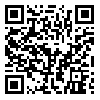Volume 1, Issue 2 (Autumn and Winter 2020)
پژوهش های مابعدالطبیعی 2020, 1(2): 179-204 |
Back to browse issues page
Download citation:
BibTeX | RIS | EndNote | Medlars | ProCite | Reference Manager | RefWorks
Send citation to:



BibTeX | RIS | EndNote | Medlars | ProCite | Reference Manager | RefWorks
Send citation to:
jahromi R, mohammapur M. Kant's Conception of Religion and Ethics with Reference to "Religion within the Limits of Reason Alone". پژوهش های مابعدالطبیعی 2020; 1 (2) :179-204
URL: http://mi.khu.ac.ir/article-1-103-en.html
URL: http://mi.khu.ac.ir/article-1-103-en.html
1- , raayatjahromi@hum.ikiu.ac.ir
Abstract: (1815 Views)
Immanuel Kant, with the religious grounds of piety in the book of religion within the limits of reason alone, describes his desired religion in terms of the nature and mechanism of action and the duality of human nature in terms of goodness and evil that, after a struggle between the two principles of good and evil, ultimately leads to the overcoming of good and the establishment of the rule of God on earth. It can be said that his religious system is to improve human beings and to supplement his moral system. Eventually, the floodwaters of good will must be joined together and form the common moral community. It can be said that his religious system is for the purpose of reforming mankind and complements his moral system. Eventually, the floodwaters of good will should be joined together and form a common moral community, because salvation for Kant is an extremely influential process, and ultimately, Divine grace ensures this community. In this regard, he uses ethics, Christianity, the Church, and the Bible as a prototype and a tool for a pure moral religion. However, we face a kind of religious reduction, but surely he seeks to find the appropriate answer for todaychr('39')s human needs. Kantchr('39')s thought can be seen as an example of human self- Autonomy that has been able to interpret the truth and realities of Important, such as religion, with the focus on man being.
Type of Study: Original Article |
Subject:
Philosophy
Send email to the article author
| Rights and permissions | |
 |
This work is licensed under a Creative Commons Attribution-NonCommercial 4.0 International License. |








